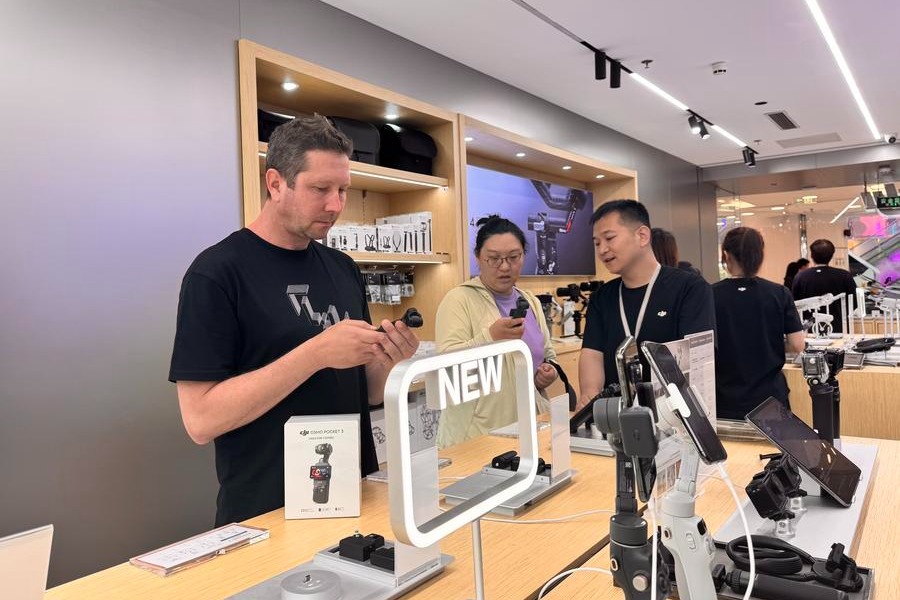Guideline draws road map for BCI tech

China aims to achieve breakthroughs in key brain-computer interface technologies and accelerate their application in industrial manufacturing, healthcare and consumer spending by 2027, according to a guideline released this week.
By 2030, the nation seeks to establish a safe and reliable industrial ecosystem and cultivate two or three globally influential enterprises, positioning itself among the world leaders in the field, said the guideline released on Thursday by the Ministry of Industry and Information Technology and six other government departments.
Brain-computer interface, or BCI, creates a communication pathway between the brain's electrical signals and external devices. Among the technology's most visible outcomes in recent years is the brain implant that enables paralyzed patients to regain control of their body parts.
The guideline lays out a road map for developing the technology, which merges life sciences and information sciences, as related innovations are burgeoning and "disruptive breakthroughs" are in the pipeline, authorities said.
Among an array of key tasks is boosting basic hardware and software research, including striving for breakthroughs in making BCI chips used to collect and process neural signals, as well as ultralow-power and high-performance communications chips to enhance the transmission of brain signals and reject interference.
The guideline also calls for research into novel products such as ultralow-power implantable chips, while improving the performance of well-established products such as deep brain stimulators and cochlear implants.
Efforts will be made to upgrade nonimplantable devices, such as forehead-mounted, ear-worn, in-ear and hairclip-style products, as well as integrate BCI systems with helmets, headsets, glasses, headphones and other electronics.
The guideline pledges to nurture enterprises of different sizes in the field, establish industrial parks and clusters, and promote cooperation with companies specializing in artificial intelligence, new materials and robotics.
Authorities will also accelerate the formulation of BCI standards and regulate the collection, storage and use of brain-related information.
National funds and other investments will be encouraged in the field, while medical implants and other key products will receive favorable policies in the market approval process.
"Foreign enterprises and institutions are encouraged to set up research and development centers or manufacturing facilities in the nation… domestic institutions are supported to participate in international conferences to contribute Chinese strategies and wisdom," the guideline said.
According to a report released in 2023 by the China Academy of Information and Communications Technology and the Brain Computer Interface Industrial Alliance, there are at least 30 application directions for BCI, with the healthcare industry accounting for over 55 percent and the rest comprising the sectors of consumption, manufacturing and education.
Globally, there are about 200 healthcare companies tapping into BCI technology and researching its role in treating epilepsy, Parkinson's disease, cognitive impairment and other neurological diseases, as well as restoring or enhancing motor and sensory function.
In China, several hospitals have rolled out clinical trials involving the use of BCI technologies to help patients who have suffered severe spine injuries or epilepsy recover motor skills.
In May, Beijing Tiantan Hospital launched the nation's first BCI clinical application center.
Zhao Jizong, an academician at the Chinese Academy of Sciences and a senior neurosurgeon at the hospital, said domestically developed BCI implants have been used in a number of clinical cases.
"The center will offer whole-chain management of patients, from screening and surgery to rehabilitation, and we aim to address challenges in rolling out clinical trials and assessing outcomes so as to speed up the technology's clinical use," he said in an interview with China Central Television.
wangxiaoyu@chinadaily.com.cn
- China sees return travel rush as National Day holiday comes to end
- China to see rainfall, temperature drop
- Ancient grottoes in Southwest China survive, thrive via innovative measures
- Macao sees tourism boom during National Day, Mid-Autumn Festival holidays
- Shanghai's Huaxin town showcases rural revitalization efforts
- Taiwan residents flock to mainland during holiday season





































